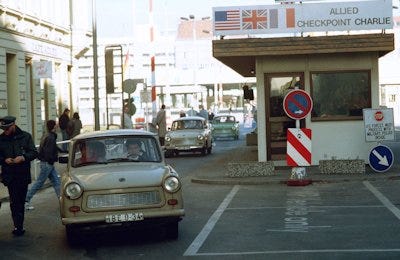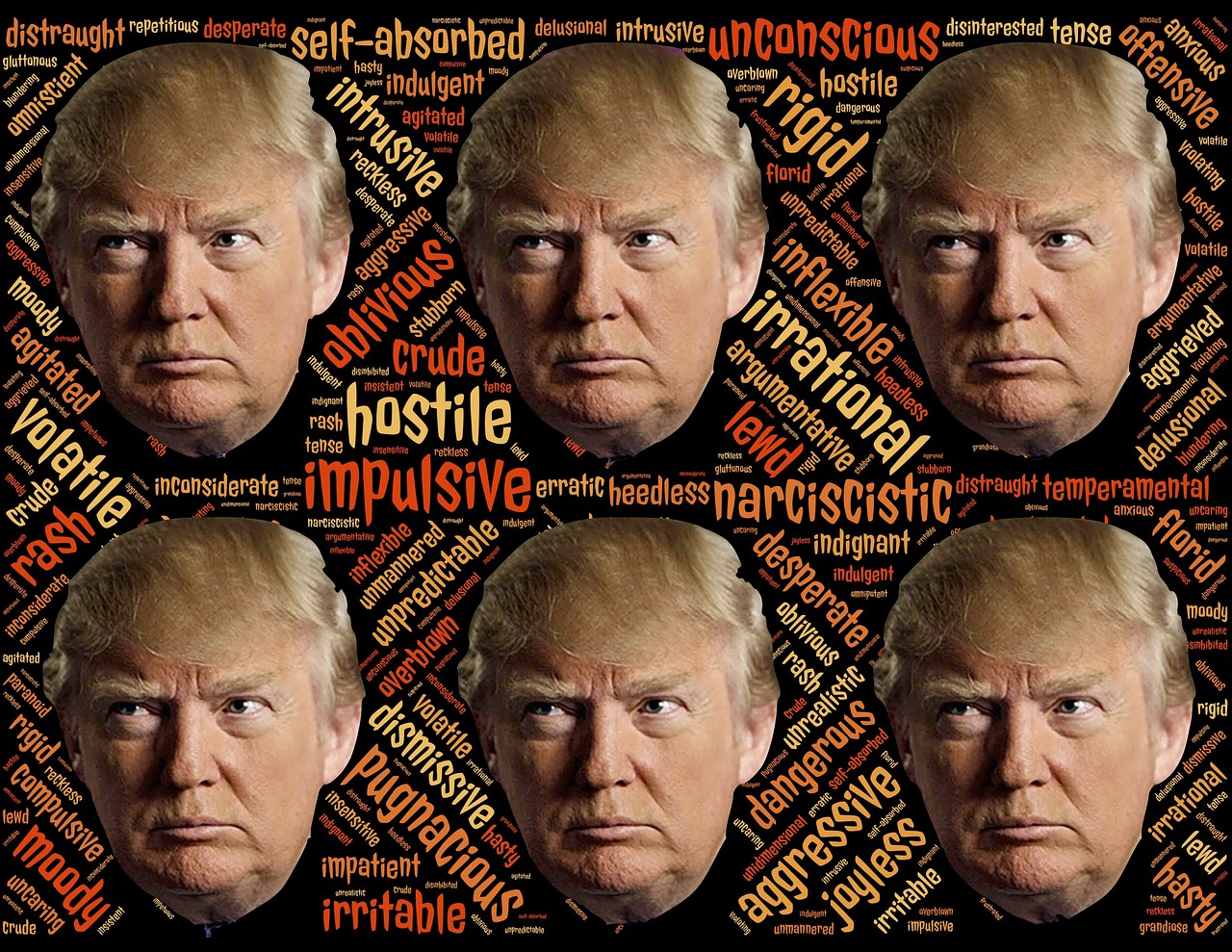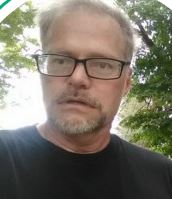I Tore Down the Berlin Wall With My Own Hands
I really did tear down the Berlin Wall with my hands. With a little help. The night the Wall fell, I was a young American airman stationed in West Berlin. I rushed to Checkpoint Charlie the moment I heard people were streaming through, then spent several days high on adrenaline, watching the world change. My story about that night is just below, but first, some thoughts on how we Americans got to the dark place we find ourselves in today.
The 
The Cold War ended, and the globe’s only two superpowers started down a path that would end decades of existential enmity. A tsunami of geopolitical consequences swelled to life, almost without notice. The night after the Fall, nothing looked different.
The night the Wall fell, nobody realized that populism, nationalism, and Great Power politics might return to haunt Europe and the United States.
The night the Wall fell, the idea that an overtly nationalist US president would join forces with a Russian strongman would have sounded absurd.
The night the Wall fell, the idea that a US president could leverage power by demanding the construction of a similar monstrosity in North America would have raised howls of scorn.
Make America great again!
“This country needs a new administration, with a renewed dedication to the dream of America — an administration that will give that dream new life and make America great again!”
Donald Trump was not the first American president to call for a return to greatness. The words I quoted above were uttered by Ronald Reagan on September 1, 1980 as he kicked off his presidential campaign in Jersey City by the shores of New York harbor.
He went on to explain his choice of location:
It’s fitting that on Labor Day, we meet beside the harbors… with the eyes of Miss Liberty on our gathering and in the words of the poet whose lines are inscribed at her feet, “On the air bridged harbor that twin cities frame.”Through this “Golden Door,” under the gaze of that “Mother of Exiles,” has come millions of men and women, who first set foot on American soil right there, on Ellis Island, so close to the Statue of Liberty.
Ronald Reagan began his campaign for President by praising poor, hardworking immigrants. During his administration, he signed a law that awarded official residency and eventual citizenship to millions of migrants from Mexico. He signed an executive order forbidding the deportation of hundreds of thousands of children.
I’m not laying out those facts to praise Reagan. His vision of economics and labor relations harmed vulnerable Americans and began a march to the great income disparity that haunts us today. His stubborn refusal to confront the HIV/AIDS crisis delayed the development of effective treatment and condemned hundreds of thousands to needless death.
During his presidency, Reagan stoked fears of anti-white racism, indulged in homophobic rhetoric, and allied himself to the Moral Majority, an energetic opponent of LGBTQ people.
I’m no fan of Reagan, but despite my profound disagreements with his governance, I recognized in him the spirit of a fellow American. His vision of the future was one of hope and optimism, one centered on at least theoretical respect for working people and poor immigrants.
On June 12, 1987, I stood in a crowd at the Brandenburg Gate in West Berlin listening to Reagan speak. “Mr Gorbachev,” he proclaimed. “Tear down this Wall!”
My heart thrilled to the stirring tones, but I had little hope that anything could change. I lived in a world where a Wall had divided friends and family for generations, not just in one city, but down the entire length of Germany and much of Europe.
I had lived in Berlin for years. The Wall was an evil, depressing barricade of razor wire and concrete that surrounded us always, imprisoning us physically and spiritually. You could never quite forget that it was there, a barrier to be met in any direction you might choose to travel.
My best friend Mike and I were young. We’d immersed ourselves in the life of the City. He was a native speaker of German and I learned fast. Our friends were almost all young Berliners. We felt ourselves almost as much spiritual citizens of that great city as we did Americans.
We shared an apartment off the Kurfürstendamm, the main drag of the western city.
We were spoiled in a way, privileged like most West Berliners. We enjoyed a lifestyle that was all beautiful bright lights and luxury; green parks and art; educated, sophisticated, happy people.
West Berlin was a temple in a way, raised partly in defiance and partly in celebration. It was an oasis of riotous color and life surrounded by a flat sea of grey.
We visited East Berlin from time to time and always left somber and depressed.
I remember biking one sunny afternoon and getting lost. Just a little lost. I rolled past garden plots and waved to happy people planting flowers and picking vegetables. I didn’t stop to ask directions because I didn’t much care where I was. I could find my way home later.
Then a sudden darkness blocked the sun and threw me into a chill shadow. I had reached the Wall, not even knowing it was near. That’s what it was like to live in West Berlin. The wall would slap you unexpectedly and take your breath away. You could never quite get used to it.
The autumn night in 1989 when the world changed, Mike and I were sitting in the kneipe, the pub in the ground floor of our building. We were probably eating pizza. We knew everyone there, including the owner, an older woman who always looked out for us and teased about not eating enough.
The TV news startled everybody. We couldn’t believe it. People were massing at the checkpoints. Crossing over without being shot? Not possible!
Not how the universe operates. Established order has been violated. It can’t be. Something awful must happen now.
Jaws dropped. People stared, confused, at the TV above the bar. Eternal moments passed. Then the yelling started. And the running.
The kneipe emptied out.
Mike and I followed our hostess down a dusty flight of stairs into the keller. We hauled up cases of sekt, German sparkling wine. She was crying and smiling at the same time.
The three of us dragged as much wine as we could onto the U-Bahn and took the train to Checkpoint Charlie.

Checkpoint Charlie by SSgtt F. Lee Cockran, Public Domain
For the first time ever, I watched people massing in the wrong direction. Like gravity had suddenly reversed polarity.
The air crackled with electric joy and love. I could taste it on my tongue. Nothing in my life has ever since compared.
We passed out paper cups of wine until it was gone. We watched people falling to the ground and kissing it. We heard scream after scream and moan after moan. People were lost in emotions they didn’t know how to express.
We left at dawn and ran home to change into our American uniforms and go to work. We were instructed to go nowhere near the Wall. As soon as work was over, it was straight back home and into civvies and onto the Brandenburg Gate.
We scrambled up and joined a small band of Berliners from both the East and the West. We didn’t need sleep. I don’t think I slept for 72 hours.
We caught our breath and almost choked every time we watched some daring boy dart out into no man’s land. Would it end? Would the guards in the towers start shooting?
Soon, the guards disappeared. Mike and I joined thousands of Berliners with hammers and chisels. We attacked the wall like an army of enraged ants, demolishing the evil of it one little bite at a time.
That’s what it was like to be present for the Fall. The weeks and months after were more difficult and in many ways more depressing. The ecstasy was tempered by hard realities. The glorious temple that was West Berlin must change.
I never dreamed how much my own country would change —
I never dreamed a day would come when an American president would attempt to build his own wall, would rip families apart, cage children, demonize peaceful migrants, and arouse his political base with overt racism, homophobia, and white nationalism.
As much as I hated what Reagan did to the US, I never imagined that a man would rise to power who would unleash demons I hadn’t personally experienced since the days when I walked miles of concrete and razor wire in a city divided by hatred and fear.
Mr. Gorbachev, tear down this Wall!
I echo that sentiment. Mr. Trump, tear down your walls of division, fear, and racism. Tear down your walls of hatred and homophobia.

Mr. Trump, your time has come and gone. It’s time for decent Americans to rebuild our nation. It’s time to search for greatness, which must start with love, diversity, and equality for all
James Finn






